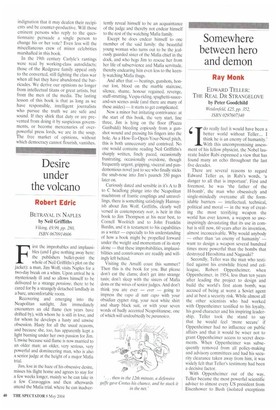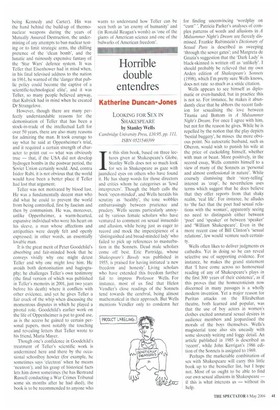Somewhere between hero and demon
Ray Monk
EDWARD TELLER: THE REAL DR STRANGELOVE by Peter Goodchild Weidenfeld, £25, pp. 352, ISBN 0297607340 Ido really feel it would have been a better world without Teller... I think he is an enemy of humanity.' With this uncompromising assessment of his fellow physicist, the Nobel laureate Isidor Rabi expressed a view that has found many an echo throughout the last five decades.
There are several reasons to regard Edward Teller as, in Rabi's words, 'a danger to all that is important'. First and foremost, he was 'the father of the H-bomb-, the man who obsessively and single-mindedly overcame all the formidable barriers — intellectual, technical, political and moral — in the way of creating the most terrifying weapon the world has ever known, a weapon so aweinspiringly devastating that its use in combat is still now, 60 years after its invention, almost inconceivable. Why would anybody — other than 'an enemy of humanity' — want to design a weapon several hundred times more powerful than the bombs that destroyed Hiroshima and Nagasaki?
Secondly, Teller was the man who testified against his erstwhile friend and colleague, Robert Oppenheimer, when Oppenheimer, in 1954, less than ten years after leading the project to design and build the world's first atom bomb, was accused of being at worst a Soviet agent and at best a security risk. While almost all the other scientists who had worked with Oppenheimer testified to his loyalty, his good character and his inspiring leadership, Teller took the stand to say that he would feel 'more secure' if Oppenheimer had no influence on public affairs and that it would be wiser not to grant Oppenheimer access to secret documents. When Oppenheimer was subsequently removed from all policy-making and advisory committees and had his security clearance taken away from him, it was widely felt that Teller's testimony had been a decisive factor.
With Oppenheimer out of the way, Teller became the most powerful scientific adviser to almost every US president from Eisenhower to Bush (isolated exceptions being Kennedy and Carter). His was the hand behind the build-up of thermonuclear weapons during the years of Mutually Assured Destruction, the undermining of any attempts to ban nuclear testing or to limit strategic arms, the chilling pretence of the 'clean bomb', and the lunatic and ruinously expensive fantasy of the 'Star Wars' defence system. It was Teller that Eisenhower had in mind when, in his final televised address to the nation in 1961, he warned of the 'danger that public policy could become the captive of a scientific-technological elite', and it was Teller, so many people believed anyway, that Kubrick had in mind when he created Dr Strangelove.
However, though there are many perfectly understandable reasons for the demonisation of Teller that has been a stock-in-trade of the intellectual Left for over 50 years, there are also many reasons for admiring the man. It took courage to say what he said at Oppenheimer's trial, and it required a certain strength of character to point out — what was obviously true — that, if the USA did not develop hydrogen bombs in the postwar period, the Soviet Union certainly would. And, contra Isidor Rabi, it is not obvious that the world would have been a better place if Teller had lost that argument.
Teller was not motivated by blood lust. He was a fundamentally decent man who did what he could to prevent the world from being controlled, first by fascism and then by communism. He was, moreover, unlike Oppenheimer, a warm-hearted, expansive individual who wore his heart on his sleeve, a man whose affections and antipathies were deeply felt and openly expressed; in other words, an essentially lovable man.
It is the great merit of Peter Goodchild's absorbing and fair-minded book that he conveys vividly why one might detest Teller and why one might love him. He avoids both demonisation and hagiography; he challenges Teller's own testimony (the final version of which was published in Teller's memoirs in 2001, just two years before his death) where it conflicts with other evidence, and yet he gives Teller a fair crack of the whip when discussing the momentous disputes in which he played a pivotal role. Goodchild's earlier work on the life of Oppenheimer is put to good use, as is the access he gained to certain personal papers, most notably the touching and revealing letters that Teller wrote to his friend, Maria Mayer.
Though one's confidence in Goodchild's treatment of Teller's scientific work is undermined here and there by the occasional schoolboy howler (for example, he sometimes says 'electron' when he means 'neutron'), and his grasp of historical facts lets him down sometimes (he has Bertrand Russell conducting a War Crimes Tribunal some six months after he had died), the book is to be recommended to anyone who wants to understand how Teller can be seen both as 'an enemy of humanity' and (in Ronald Reagan's words) as 'one of the giants of American science and one of the bulwarks of American freedom'.













































































 Previous page
Previous page